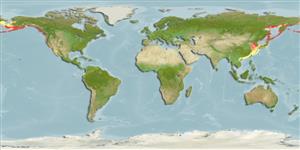>
Perciformes/Cottoidei (Sculpins) >
Agonidae (Poachers) > Brachyopsinae
Etymology: Pallasina: Because of Petrus Simon Pallas, ichthyologist and explorer of Siberia and Asia. He studied the geology, botany and zoology, working in the laboratory of Ichthyology created by Peter the Great. He observed the transit of Venus. Berlin, 1741-1811.
More on author: Steindachner.
Environment: milieu / climate zone / depth range / distribution range
Ecologia
marinhas demersal; intervalo de profundidade 0 - 105 m (Ref. 50550). Temperate
North Pacific: Sea of Japan to the Bering Sea and to Bodega Bay, central California, USA. Past works (e.g. Hart 1973, Ref. 6885) recognized two subspecies, Pallasina barbata barbata occurring in the Bering Sea and along the Asian coast through the Sea of Okhotsk to Japan and Pallasina barbata aix occurring from the Gulf of Alaska to California, USA, as well as Kamchatka and Japan. Sheiko 1993 on the other hand recognizes both Pallasina barbata and Pallasina aix as valid species (Ref. 26282).
Tamanho / Peso / Idade
Maturity: Lm ? range ? - ? cm
Max length : 17.0 cm TL macho/indeterminado; (Ref. 56557)
Descrição suscinta
Chaves de identificação | Morfologia | Morfometria
Espinhos dorsais (total) : 5 - 8; Raios dorsais (total) : 6 - 9; Espinhos anais: 0; Raios anais : 8 - 13. Caudal fin rounded (Ref. 28197). Preserved specimens dark brown, darker dorsally, paler ventrally (Ref. 28197). A stripe on head, from tip of snout to, through part between temporal ridge and uppermost preopercular spine, to posterior upper part of opercle (Ref. 28197). Fins pale, except for the dark caudal fin (Ref. 28197). Tiny spots on dorsal and pectoral fin rays (Ref. 28197).
Inhabits intertidal areas and to 55 m depth, possibly to 128 m (Ref. 2850). Often found among eelgrasses or seaweeds (Ref. 2850).
Ciclo de vida ou comportamento de acasalamento
Maturities | Reprodução | Spawnings | Egg(s) | Fecundities | Larvas
Kanayama, T., 1991. Taxonomy and phylogeny of the family Agonidae (Pisces: Scorpaenifomes). Mem. Fac. Fish. Hokkaido Univ. (38)1-2:1-199. (Ref. 28197)
Status na Lista Vermelha da UICN (Ref. 130435)
Ameaça para os humanos
Harmless
Uso pelos humanos
Ferramentas
Relatórios especiais
Baixar XML
Fontes da internet
Estimates based on models
Preferred temperature (Ref.
123201): 1.4 - 14.8, mean 4.2 °C (based on 913 cells).
Índice de diversidade filogenética (Ref.
82804): PD
50 = 1.0000 [Uniqueness, from 0.5 = low to 2.0 = high].
Bayesian length-weight: a=0.00389 (0.00180 - 0.00842), b=3.12 (2.94 - 3.30), in cm total length, based on all LWR estimates for this body shape (Ref.
93245).
Nível Trófico (Ref.
69278): 3.2 ±0.3 se; based on diet studies.
Resiliência (Ref.
120179): médio(a), tempo mínimo de duplicação da população 1,4 - 4,4 anos (Preliminary K or Fecundity.).
Fishing Vulnerability (Ref.
59153): Low vulnerability (10 of 100).
